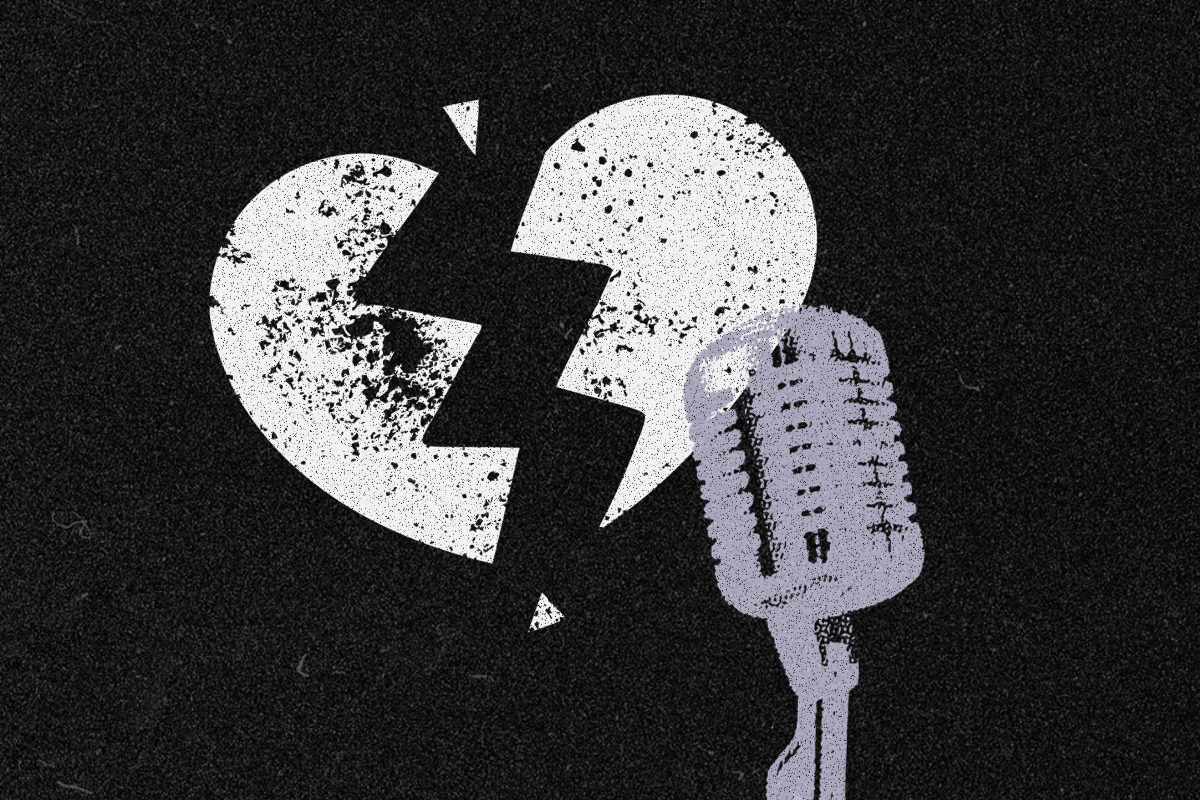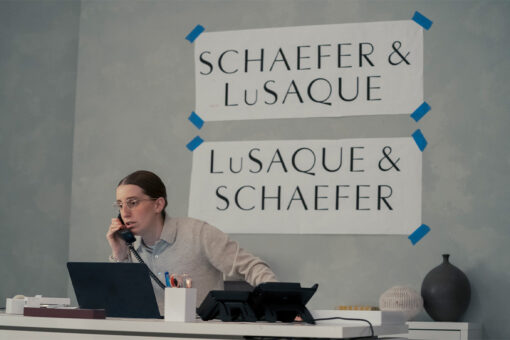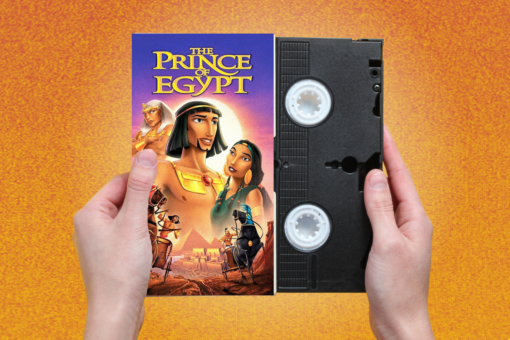Had I known a few weeks ago that the Jewish comedy show I was planning would be happening in the midst of the greatest humanitarian crisis of my lifetime, I probably wouldn’t have named it “The Bean’s Adult B-Mitzvah.”
But I’m getting ahead of myself.
Hi, I’m Evelyn. I’m Hey Alma’s associate editor and, as I happen to use my spare time to contribute to Reductress, The Onion and perform stand-up, I’m also our in-house comedian. Over the last few years, I’ve had the absolute pleasure of hosting numerous Hey Alma comedy shows, bringing our mostly online community together in person to laugh along with some of the best Jewish comics in the U.S. Since August, I had been working hard on planning the latest Hey Alma comedy show. Excitingly, it was going to happen in Chicago, our first show outside of New York. We found the perfect venue and the perfect mix of Jewish comedians. I also thought of (what seemed at the time to be) the perfect, silly name: The Bean’s Adult B-Mitzvah.
Then, less than two weeks before the show, Hamas attacked Israel.
Ever since then, comedy has been almost the last thing on my mind. Instead, that brain space has been subsumed with the near constant wave of updated Israeli and Palestinian death tolls, the faces and names of Israeli hostages and their families and horrific images and stories of Palestinians trying to survive. At the same time, I’ve also been using my energy working with the Hey Alma team to ensure our community has had the space to grieve, feel comfort and find tools to help identify reliable news sources as the Israel-Hamas war continues to unfold.
Throughout it all, a tiny voice thrummed in the back of my head. It continued to bother me as I agonized over my remarks to open the upcoming comedy show, obsessively writing and re-writing a combination of light-hearted jokes and an acknowledgment of how painful the world is right now. “Shit! I have to be funny in a week,” the tiny voice said. “Shit! I have to be funny in five days. I have to be funny tomorrow. I have to be funny in an hour. I have to be funny…”
Last night, “The Bean’s Adult B-Mitzvah: A Stand-Up Comedy Show” happened. And I’m so grateful to report that it was beautiful. And the show’s success was not in spite of our collective grief, but rather, because of it.
Despite my nerves, I felt a determined sense of calm last night when I entered The Color Club, the intimate, independent Chicago venue which hosted the show. Fifty chairs and a few tables created a focal point of a small stage and microphone, bathed in pink light. It still felt a bit preposterous that I would soon take that mic and encourage a room full of people, presumably mostly Jewish, to laugh and feel joy in this moment. But three things kept me going.
One: Last Saturday, Pete Davidson opened the first episode of “Saturday Night Live” since the strike with a powerful tribute to Israeli and Palestinian children. “Sometimes comedy is really the only way forward through tragedy,” Davidson (who’s Jewish) remarked with poise. “My heart is with everyone whose lives have been destroyed this week. But tonight, I’m going to do what I’ve always done in the face of tragedy, and that’s try to be funny.”
I’ll admit that I sometimes struggle with being too cynical, meeting people’s good intentions with skepticism and derision. I think my younger self would have found Pete’s comments to be trite or insincere. But in this moment, I could not more fully believe in the power of laughing through the pain, especially as a part of Jewish tradition. (If you don’t know what I’m referring to, perhaps watch Mel Brooks’ musical sketch about the Spanish Inquisition, Taika Waititi’s portrayal of Hitler in “Jojo Rabbit” or the movie “Life Is Beautiful.”) As I did a sound check and got ready to open the house, Pete’s words carried me through.
Two: In the green room, I also found my resolve. As audience members found their seats, I chatted with the comedians about their sets and the Chicago comedy scene. One of the comics broke through the chatter somewhat abruptly. “Are you going to do a disclaimer at the top of the show?” Becca Nix Tham asked me.
I nodded slowly.
“Oh good. I was on a show last night without any other Jews or Muslims on the line-up and nobody acknowledged what’s happening. It was so strange and felt bad.”
Up until then, a part of me longed to not have to mention the conflict onstage, to bring up all our grief and pain. I wished for the version of the evening where I got to do an opening set about other Chicago landmarks I thought were Jewish (Wrigley Field: yes; Lake Michigan: yes; The Willis Tower: nope, too tall). But who would that be for? What would it accomplish? Comedy is built for moments like these, for getting up onstage and saying, “I’m so sad about the world that I can’t breathe, so fuck it. If we can’t breathe anyway, we might as well laugh.”
So I tried to do just that.
When the music went down and I hopped up on stage, I remembered the third reason why I was doing this: for the members of the Hey Alma community who were there. Young and old Jews, queer Jews, Jews of color, Jews who came with friends and with family and some by themselves looked at me in front of them and I saw them. Together, we were going to bear witness to our pain.
“Before we get into the show, I wanted to take a moment to acknowledge that this is a really painful time for so many communities — for Jews, Muslims, Israelis and Palestinians all over the world and right here in Chicago,” I said. “But I’m a believer in the Jewish tradition of laughing through our pain. And I believe in the practice of making space to set our grief aside for a moment to make room for levity. Thank you for being in community with me here tonight.”
And then I introduced the comics. Becca Nix Tham joked about her interfaith Asian-Jewish background, being asexual and “Star Wars” audio porn. Michael Abber told a hilarious story about the comments section of his stand-up reel and how it brought together Israelis and Palestinians in their mutual hatred of him. Clara Olshansky talked about their nonbinary identity and how their top surgeon was not a fan of their boobs. And Eunji Kim closed out show with a set that focused on her conversion (she says she converted all the way because now she has IBS) and how her son gets Asians and Jews confused. The entire time, the room was safe, warm and kind. I laughed so hard my stomach hurt and my hands shook as I tried to get photos and videos of everyone’s sets.
And then it was over. After the show finished, an audience member tagged Hey Alma on Instagram saying it was “a perfect evening communing with other Jews.” As I was on my way out, other audience members thanked me for doing the show, perhaps not realizing that their presence was as therapeutic to me as the comics were for them.
On the way back to my hotel, my Uber driver took me down Lake Shore Drive, Chicago’s urban parkway which bumps up against the Lake Michigan shoreline. It was there, looking out onto Lake Michigan, so tired from the show, that I found the space to cry, for the first time, for those we have lost in the last two weeks. Looking out onto the dark, watery expanse, I kept crying for those we will almost certainly lose if there is no ceasefire of rockets to and from Israel and Gaza. I cried for a few more minutes until I had no more tears. Then I thought about the show and our beautiful Jewish community and all the laughter we had created together. And, for at least a few moments, it felt like a prayer for peace.



